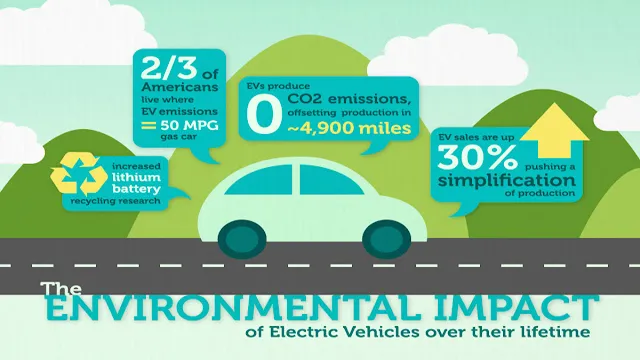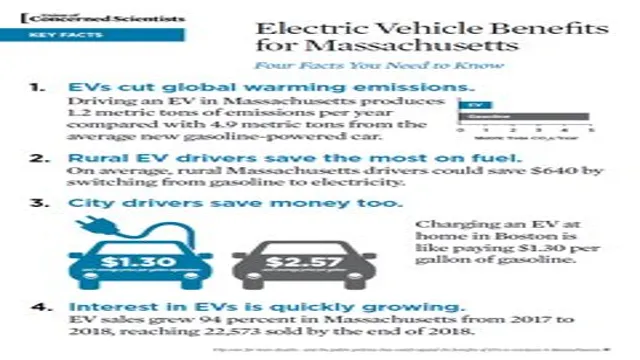Revving Up a Greener Future: Exploring The Environmental Benefits of Electric Cars
Electric cars have burst onto the scene in recent years, and it’s not hard to see why. They provide a cleaner, more efficient mode of transportation that can save drivers an incredible amount of money in the long run. But while the environmental and financial advantages are certainly compelling, they’re not the only benefits that electric cars have to offer.
In fact, there are a number of surprising advantages that come with going electric. In this blog post, we’ll explore some of the lesser-known advantages of electric cars, including improved performance, increased safety, and even better health outcomes. So buckle up and let’s dive in!
Reduced Carbon Emissions
Electric cars are a game-changer when it comes to reducing carbon emissions. As the world becomes more aware of the damaging effects of greenhouse gases on the environment, there has been a concerted effort to reduce our carbon footprint. One way that electric vehicles help in this regard is by emitting fewer pollutants into the air.
Unlike traditional gasoline-powered cars, electric cars have no tailpipe emissions, which contributes significantly to cleaner air. Moreover, since electric cars run on batteries, they do not require regular oil changes or engine maintenance, which can also reduce the amount of waste produced. All in all, electric cars offer an environmentally-friendly alternative to traditional vehicles and are a key factor in the push to address climate change and reduce carbon emissions.
Electric Cars Emit No Greenhouse Gases
Electric cars are quickly becoming a popular choice among eco-conscious drivers for a good reason. Unlike their gas-guzzling counterparts, electric cars emit no greenhouse gases. This means they significantly reduce carbon emissions and help combat climate change.
By using electricity as their primary source of energy, electric cars limit the amount of carbon dioxide and other pollutants released into the atmosphere. This not only benefits the environment and our health, but also helps reduce our dependency on fossil fuels. As more and more people become aware of the positive environmental impact of electric cars, it is only a matter of time before they become the norm on our roads.
So why not consider investing in an electric car today and do your bit for the planet?

Lower Emissions From Power Plants
As concerns about climate change continue to mount, there is an increasing need for power plants to reduce their carbon emissions. By doing so, power plants can significantly reduce their environmental impact. There are several ways that power plants can reduce their carbon emissions, including replacing coal-fired plants with cleaner sources of energy, such as natural gas and renewable energy sources like solar and wind.
Another way to reduce carbon emissions is to use carbon capture and storage (CCS) technologies, which capture carbon dioxide emissions and store them underground. This way, the emissions are prevented from entering the atmosphere, mitigating their environmental impact. It’s crucial for power plants to invest in these solutions and adopt clean energy, not only for the health of the planet but also for the future of humanity.
It’s the responsibility of governments, industry leaders, and all of us to take proactive measures towards a cleaner, more sustainable future.
Energy Efficient
Electric cars provide a number of benefits to the environment, with energy efficiency being among the biggest. Unlike traditional gas-powered vehicles, electric cars run on electricity that is sourced from renewable energy sources such as solar power, wind power or hydro power. By using these sources, electric cars are able to greatly reduce carbon emissions and help combat climate change.
Additionally, electric cars are also much more energy efficient than their gas-powered counterparts, with some models able to travel over 100 miles on a single charge. This not only helps save money on fuel costs, but also reduces the overall amount of energy needed to power a vehicle. Overall, electric cars are a key part of the transition towards a more sustainable future, offering a cleaner, more efficient mode of transportation for everyone.
Electric Cars Use Less Energy
Electric cars have emerged as an eco-friendly solution that is revolutionizing the automotive industry, and they have brought energy efficiency to the forefront. Compared to gasoline vehicles, electric cars use up to 60% less energy to power the same distance. This is primarily due to the fact that electric cars convert more of the energy stored in their batteries to power the car’s motor.
The conversion process also produces less waste heat than the internal combustion engine, reducing energy loss. Additionally, many electric cars are designed with energy-saving features such as regenerative braking, where the energy from braking is stored to power the car’s battery. This energy efficiency not only saves money on fuel costs but also reduces the carbon footprint.
Electric cars are thus an excellent option to lead a sustainable lifestyle while enjoying all the benefits of driving.
Electric Motors Are More Efficient Than Gasoline Engines
Electric motors are indeed more energy efficient than gasoline engines. When it comes to converting energy into motion, electric vehicles (EVs) are much more efficient than their gasoline counterparts. In fact, electric motors convert around 75% of the electrical energy from the battery to power the wheels, while gasoline engines only convert around 20% of the energy stored in gasoline to power the wheels.
This means that electric cars use less energy to travel the same distance as gasoline-powered cars, which translates to lower operating costs and fewer carbon emissions. Plus, electric motors are much simpler than gasoline engines, which means they have fewer moving parts that could break or wear down over time. This makes electric cars more reliable and cheaper to maintain in the long run.
While EVs still face some challenges like limited driving ranges and high upfront costs, their energy efficiency and low operating costs make them a promising alternative to traditional gasoline-powered cars.
Regenerative Braking System Saves Energy
Regenerative braking systems offer a simple yet innovative way to save energy. These systems store the kinetic energy generated by a vehicle’s braking process and then use it to power the vehicle’s motor. The end result is less energy being consumed, which ultimately leads to a more energy-efficient vehicle.
The beauty of this system is that it works by simply converting the vehicle’s kinetic energy into electrical energy. This is accomplished through the use of electric motors which are installed in the vehicle’s wheels. Essentially, when the brakes are applied, the electric motors begin to function as generators, converting the vehicle’s kinetic energy into electrical energy.
This energy is then stored in the vehicle’s batteries and used to power the motor, helping to reduce the amount of energy that is needed from external sources. By utilizing this technology, vehicles become much more energy-efficient, which is essential in today’s world where environmental concerns are a major priority.
Cleaner Air
Electric cars are known for their benefits to the environment with cleaner air being one of them. These vehicles generate less pollution than traditional gas-powered models as they produce no exhaust emissions. As a result, air quality in the urban environment can improve significantly, leading to a reduction in respiratory problems such as asthma and bronchitis.
Furthermore, electric cars have a lower carbon footprint as compared to traditional gasoline vehicles since they emit less carbon dioxide in the atmosphere. This means that switching to electric cars comes with immense benefits as it reduces the number of harmful greenhouse gases being released into the environment, contributing to lower impacts of climate change. Therefore, it’s no surprise that electric cars are becoming an increasingly popular option for those wanting to reduce their impact on the environment while still enjoying all the benefits of owning a car.
Electric Cars Don’t Emit Harmful Pollutants
One of the primary benefits of electric cars is that they don’t emit harmful pollutants into the air. This is great news for anyone who cares about clean air! Gasoline cars emit a variety of pollutants when they burn fuel, including carbon dioxide, nitrogen oxides, and particulate matter. These pollutants can have a variety of negative impacts on human health, including respiratory problems, heart disease, and even cancer.
With electric cars, on the other hand, there are no emissions from the car itself. This means that driving an electric car helps improve air quality and reduce the impact of transportation on the environment. Plus, when you’re driving an electric car, you get to skip the unpleasant smells of gasoline and exhaust fumes, which is a nice bonus!
Less Noise Pollution From Electric Cars
Electric cars are not only environmentally friendly but also assist in curbing noise pollution. The switch to electric vehicles allows us to experience the bliss of quieter roads, free from engine sounds and honking. This is especially important for city-dwellers who have to endure high noise levels constantly.
Noise pollution is a severe problem that causes hearing impairment and other health hazards. By embracing electric cars, we are not only contributing to a cleaner environment but are also helping to improve the health and well-being of residents. Besides, the smooth and noise-free drive of electric cars can be likened to taking a leisurely stroll through nature, where the only sound you hear is the chirping of birds and the rustling of leaves.
It is indeed a pleasant experience, and it is all possible with the help of electric cars.
Reduced Reliance on Fossil Fuels
One of the biggest benefits of electric cars to the environment is their reduced reliance on fossil fuels. Traditional gasoline-powered vehicles emit harmful greenhouse gases that contribute to climate change and air pollution. Electric cars, on the other hand, rely on electricity to power their engines and emit zero emissions while driving.
This means that as more electric cars hit the road, there will be a decrease in the amount of harmful pollutants released into the air, improving the overall air quality and health of our communities. Plus, as more renewable energy sources like wind and solar power are incorporated into the electrical grid, the environmental benefits of electric cars will continue to increase. By switching to electric cars, we can take a major step towards reducing our dependence on fossil fuels and protecting our planet for future generations.
Conclusion
In conclusion, electric cars are like a breath of fresh air for our environment. They emit significantly fewer pollutants, reduce our dependence on fossil fuels, and help to combat climate change. Plus, with the increasing availability of renewable energy sources, the electricity used to power them is becoming more sustainable and cleaner by the day.
So, if you’re looking to reduce your carbon footprint, save money, and make a positive impact on the planet, an electric vehicle is definitely a clever and witty choice.”
FAQs
What are the environmental benefits of using electric cars?
Electric cars emit less greenhouse gases than gas-powered cars, reducing the overall carbon footprint and air pollution. They also don’t produce emissions that contribute to local air pollution, which is beneficial for people’s health and the environment.
Are electric cars more expensive than traditional gasoline cars?
Generally, yes. However, savings in fuel costs and tax incentives can make them more affordable in the long run. Additionally, as technology advances and production increases, the cost of electric cars is expected to decrease.
Does owning an electric car require a lot of maintenance?
No, electric cars require less maintenance than gas-powered cars. They have fewer parts that can break down and don’t require oil changes. However, owners should still have regular inspections and maintenance to keep the battery and other components in good condition.
Can electric cars help reduce dependence on foreign oil?
Yes, since electric cars can be charged from a variety of sources such as solar, wind, and hydroelectric power. Using domestic renewable energy to power electric cars can reduce dependence on foreign oil and increase energy security.



